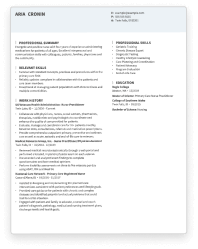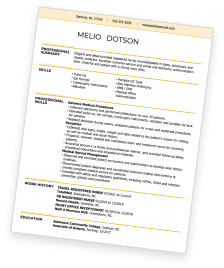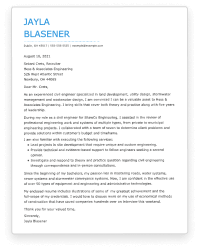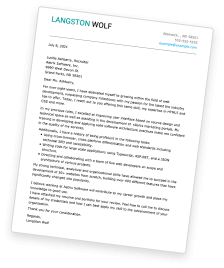Science Resume: Overview
Professionals in the sciences play vital roles in research, analysis, and problem-solving. Their responsibilities encompass a wide range of specializations, often involving conducting experiments, collecting data, and interpreting findings.
Some common job titles in the sciences include:
- Research Scientist
- Data Analyst
- Laboratory Technician
- Environmental Scientist
- Biotechnologist
Whether you are building a computer science resume or a resume for an experienced data scientist, we can help you build a professional and impressive resume. Explore our entire collection of customizable resume examples and downloadable resume templates to create a compelling resume showcasing your skills and expertise.
Science Resume Example: Biochemist
This biochemist resume sample is a great example of how to write a resume for a science profession. Take a look at its features, including its content and aesthetic choices, to get an idea on how to write your next resume.
-
Professional Layout:
The clean and organized design of this science resume helps make the qualifications visually appealing, giving it a better chance at standing out and making a positive impression.
-
Quantifiable Achievements:
This resume example highlights specific accomplishments, such as designing and conducting 10 experiments for a team research portfolio, demonstrating the valuable impact of their work.
-
Professional Summary:
This biochemist resume template includes a concise, professional summary at the top of the page, highlighting the applicant’s knowledge and skills.
-
Use of Color:
This example of a science resume includes subtly using color to differentiate sections and create a visually appealing document.
Science Resume Example: Research Analyst
This science resume example for a research analyst showcases skills and experience in collecting and analyzing data, making it a great template to build your resume around.
-
Effective Content:
This resume example emphasizes key experience and relevant skills for a research analyst position, providing a comprehensive view of the candidate's qualifications.
-
Relevant Skills:
Skills such as MATLAB and Tableau are listed on the resume, which is a good example on how to make the resume stand out, particularly for applicant tracking systems (ATS).
-
Valuable Growth:
Experience with results such as "resolved 30% of issues" help demonstrate an impressive commitment to improvement.
-
Easy to Read:
Whitespace and clear section headers make it easy to read this science resume example without sacrificing necessary content.
How to Write A Science Resume: A Step-by-Step Guide
A great job application starts with understanding how to write an effective resume. Our step-by-step guide will walk you through the process, ensuring your resume effectively communicates your scientific expertise to potential employers.
-
Choose a Format:
There are three different resume formats to choose from and the right one for you will depend on your needs, professional goals, and experience level in the sciences. The chronological format is ideal for science professionals with an extensive work history as it highlights work experience and career progression.
A combination resume gives equal importance to skills and work history. It is best for slightly less experienced candidates or career changers who want to show they have the required skills and knowledge. Finally, the functional format is a good option for entry-level professionals with zero experience or those with employment gaps as it focuses heavily on skills and achievements, shifting attention away from a sparse work history section.
-
Contact Information:
Include accurate and up-to-date contact details at the top of your resume so employers can find it easily. Provide your first and last name, phone number, a professional email address, and your location (city and state). You may also provide a LinkedIn or professional website if appropriate.
-
Summary or Objective:
Write a concise and impactful professional summary or objective statement at the top of your resume that captures what makes you a standout candidate. If you have relevant work experience in the sciences, opt for a resume summary that succinctly outlines your work history, most notable skills, key accomplishments, and unique value proposition. You might also want to mention any specialized areas of expertise, research or technical abilities.
If you’re changing careers or just starting out in the industry, consider using an objective statement instead to highlight your career aspirations and interests and align them with the specific role you’re targeting.
-
Work History:
List relevant scientific work experience in reverse chronological order, providing job title, name of your employer, location, and dates employe. Place an emphasis on your accomplishments and research projects, and do your best to provide quantifiable information to underscore your unique value.
-
Skills:
Highlight your essential analytical, research, and technical skills, beginning with those mentioned in the job description. Pick skills that are specific to the job so that your resume stands out as relevant.
-
Education:
Detail your educational background, including degrees, name of the institution, and location. Additionally, you can provide any relevant coursework or accomplishments to further your credentials.
-
Additional Sections:
You may add relevant sections, such as publications, presentations, or awards to help bring more attention to your scientific qualifications.
Key Skills and Certifications For Science Resumes
All jobs in the sciences require a robust set of skills, including hard skills and soft skills, as well as certain certifications, which must be included on your resume to showcase your qualifications.
Top 5 Hard Skills for Science Resumes
- Research Methodology: Proficiency in research methodology involves the ability to design and execute systematic and effective research processes, including data collection, experimentation, and analysis, to gather valuable insights and make informed decisions.
- Data Analysis: Data analysis entails processing and interpreting data through statistical techniques and software tools to extract meaningful patterns, trends, and conclusions, which is crucial for evidence-based decision-making in scientific fields.
- Laboratory Techniques: Laboratory techniques encompass a wide range of skills related to the safe and accurate execution of experiments, including sample preparation, equipment operation, and adherence to protocols, ensuring reliable and replicable results.
- Statistical Analysis: Statistical analysis involves the application of statistical methods to examine data, test hypotheses, and draw valid conclusions, helping scientists assess the significance and reliability of their findings.
- Technical Proficiency: Technical proficiency in scientific fields often includes expertise in specific programming languages, software applications, and tools relevant to data analysis, simulations, or specialized tasks, enhancing efficiency and problem-solving capabilities.
Top 5 Soft Skills for Science Resumes
- Critical Thinking: Critical thinking is the ability to analyze complex issues, evaluate evidence, and make reasoned decisions, which is fundamental for problem-solving and innovation in scientific endeavors.
- Attention to Detail: Attention to detail involves a meticulous approach to tasks, ensuring precision and accuracy in observations, measurements, and experimental procedures, which is vital for reliable scientific outcomes.
- Problem-Solving: Problem-solving skills encompass the capacity to identify challenges, develop strategies, and implement solutions effectively, fostering adaptability and creativity in addressing scientific problems.
- Communication: Communication skills include conveying scientific findings, ideas, and complex concepts clearly and effectively to both technical and non-technical audiences, facilitating knowledge dissemination and collaboration.
- Collaboration: Collaboration involves working effectively within interdisciplinary teams, sharing expertise, fostering synergy among scientists, promoting the exchange of ideas, and advancing scientific research.
Top 5 Certifications for Science Resumes
- Certified Research Scientist (CRS): The CRS certification recognizes expertise in conducting high-quality research, emphasizing ethical standards and rigorous methodology in scientific investigations.
- Laboratory Safety Certification: Laboratory safety certification demonstrates a commitment to maintaining a safe and secure laboratory environment, which is crucial for protecting both personnel and research integrity.
- Data Analysis and Visualization Certification: This certification validates proficiency in data analysis techniques and data visualization tools, enhancing the ability to derive meaningful insights from data.
- Environmental Impact Assessment (EIA) Certification: EIA certification signifies expertise in assessing and mitigating the environmental impact of scientific projects, ensuring sustainable and responsible research practices.
- Clinical Research Professional Certification: Clinical Research Professional certification attests to the competence and adherence to ethical standards in clinical research, a critical field for developing healthcare innovations and treatments.
By showcasing valuable skills, such as effective computer skillsand certifications to potential employers, you will make your science resume stand out and have a greater impact on employers.
Helping Job Seekers Like You
7 Tips For Writing A Science Resume
- Tailor Your Resume: Customize your resume for each job application to align with the specific requirements of the position. Include keywords from the job description to demonstrate your fit for the job.
- Highlight Research Projects: Emphasize your contributions to research projects, including methodologies, data analysis, and outcomes.
- Showcase Publications: If applicable, feature any publications or presentations related to your field. Listing your publications will strengthen your resume, particularly if the topic relates to the job you are applying for.
- Quantify Achievements: Use specific metrics or data to quantify the impact of your work and research. For example, you could say you devised 10 questionnaires and surveys to generate real-time data from a target population of approximately 500 people.
- Include Technical Skills: Mention any technical skills or software proficiency relevant to your specialization.
- Highlight Soft Skills: It is also essential to highlight soft skills such as teamwork, communication, project management and critical thinking. These skills are crucial for achieving professional success in any field.
- Proofread Thoroughly: Eliminate errors and ensure clarity in presenting complex scientific information. Accuracy and attention to detail are essential skills for any job in the sciences.
Similar Resume Examples


Save Time With Hloom's Resume Builder
Key Takeaways
Always tailor your science resume content to demonstrate your relevant skills and expertise specific to the job in quesiton.
Highlight research projects, skills, and certifications relevant to the field. If applicable, also include any relevant publications, awards or other achievements.
It is important to quantify your achievements to underscore your value, so be sure to include quantities, project or data size, and percentages where appropriate.
Always proofread thoroughly. Typos or inaccurate information will reflect poorly on your attention to detail.
Showcase your hard and soft skills to make a great impression. Technical skills are essential in the sciences, while soft skills are vital to working with others and succeeding in your career.
Save Time With Hloom's Cover Letter Builder






